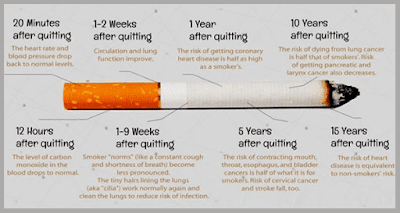- Get link
- Other Apps
- Get link
- Other Apps
There’s no way around it: smoking is definitely the worst habit one can have. However, people would rather enjoy a cigarette instead of taking care of their health. As a matter of fact, many people are simply not fully aware of the detrimental effects of smoking.
Reasons to Quit Smoking
- Smoking affects the immune system, which makes smokers more susceptible to respiratory infections
- It causes autoimmune diseases like rheumatoid arthritis and Crohn`s disease. It also plays a significant role in flare-up of symptoms of autoimmune diseases
- Smoking has been associated with type II diabetes. In fact, smokers are at 40 percent higher risk of developing type II diabetes compared to non-smokers
- Smoking increases the risk of osteoporosis, a condition manifested by weak bones and bones prone to fractures
- It increases the risk for atherosclerosis and cardiovascular disease like coronary heart disease, heart attack, heart-related chest pain, and hypertension ( high blood pressure)
- Smoking causes asthma, pneumonia, tuberculosis, chronic bronchitis, and chronic obstructive pulmonary disease (COPD), a disease manifested by wheezing, shortness of breath, and chest tightness
- Smoking increases the risk of developing age-related macular degeneration and cataract
- Smoking is believed to cause cancer in the lungs, trachea, larynx, bronchus, esophagus, lip, oral cavity, nasal cavity, bladder, kidneys, liver, colon, and many more
Giving up smoking could the best decision made in your life, as you will experience its benefits almost instantly. In fact, in as little as 20 minutes, you will start to enjoy the benefits of your decision.
- Your blood pressure levels will be normalized in the very first 20 minutes.
- The carbon monoxide levels in the bloodstream will be reduced by half within 8 hours. Consequently, the oxygen levels will normalize.
- Within 48 hours, nicotine will be fully eliminated from the body, and your senses of taste and smell will come back to normal. In addition, you will have reduced the risk of heart attack, too.
- Within 72 hours, your experience an energy boost and your airways will be able to relax.
- Your blood circulation will improve in 2 weeks, and it will continue at this pace in the next 10 days.
- The capacity of your lungs will increase by 10 percent in 3-9 months. As a result, any respiratory issues, such as coughing and breathing problems, will start decreasing.
- Your risk of heart attack will reduce by half in 1 year.
- Your risk of stroke will be the same as non-smokers in 5 years.
- Your risk of developing lung cancer will be the same as the one of the non-smokers in 10 years.
- Finally, you will have the same risk of heart attack as non-smokers in 15 years.
Health
Health Benefits
Health Problem
Health Problems
Home Remedies
Home Treatments
Quit Smoking
Stop Smoking
- Get link
- Other Apps
